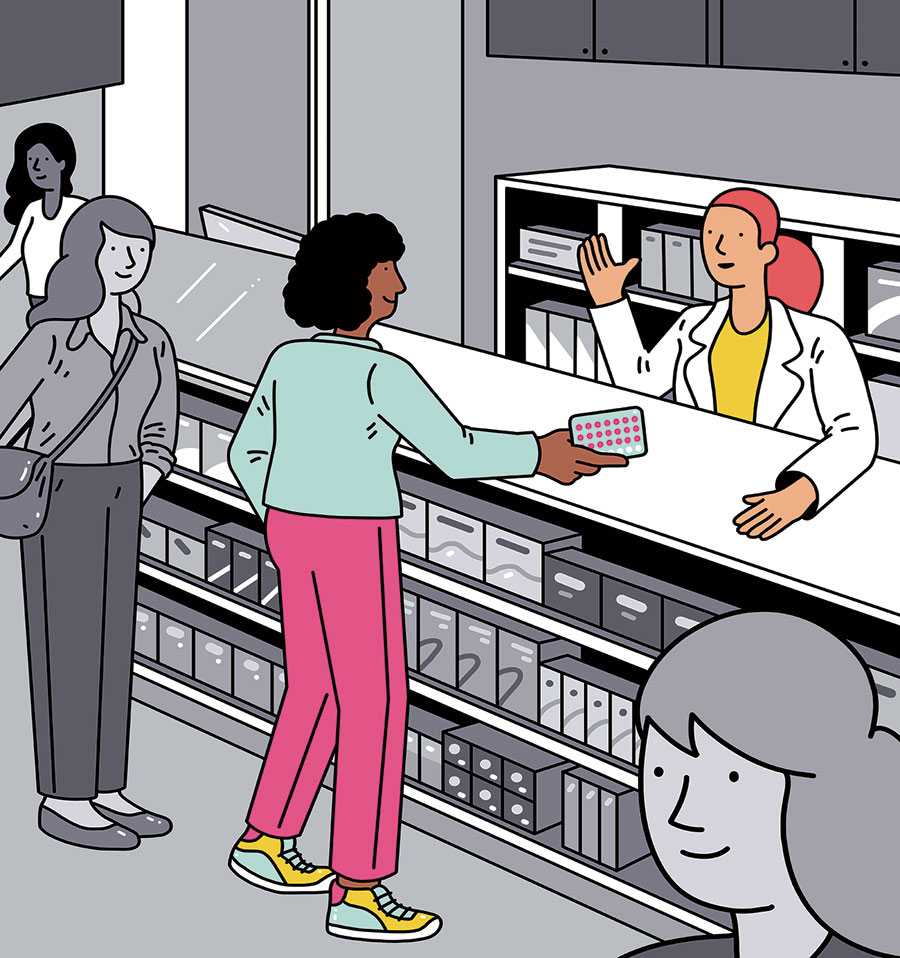Editor’s Note: This post has been updated to correct an error in the original article.
Starting January 1, Illinois women will no longer need to visit a doctor to obtain birth control. Last July, Governor J.B. Pritzker signed House Bill 0135, making hormonal contraception available following a consultation with an onsite pharmacist. Here’s what you need to know about the new law.
How does this change access to birth control?
This legislation covers self-administered hormonal contraceptive methods — birth control pills, skin patches, and vaginal rings — which were previously available only with a prescription from a physician. The bill authorizes pharmacists who undergo training to dispense hormonal birth control, provided they have a prescription or a standing order from a physician or the director of a local health department. Here’s how it works: A first-time patient would complete a self-screening questionnaire for any potential health concerns. The patient consultation must be done in a private manner. The consultation and medication are covered for patients insured by Medicaid in Illinois. (Initially, private insurance may not cover the pharmacy-dispensed medication. The Illinois Life & Health Insurance Council opposed the bill until it was amended to give insurers until 2023 to comply.)
Hormonal contraceptives are used not just for birth control but for a slew of reproductive health concerns, such as endometriosis, period regulation, and reduction of menstrual pain. Maleeha Rasheed, a 21-year-old University of Illinois Chicago student, began taking the pill to treat her polycystic ovarian syndrome, which causes ovaries to produce excessive male sex hormones. “The more people I told, the more I found that have PCOS and take birth control — almost half the women I know,” Rasheed says.
Some studies show that the pill also decreases chances of ovarian, uterine, and colorectal cancers, as well as ovarian cysts and osteoporosis, says Marc Feldstein, a gynecologist at Northwestern Women’s Health Associates.
How will this reduce unplanned pregnancies?
Nearly a third — 31 percent in 2020 — of all pregnancies in Illinois are unintended, according to the United Health Foundation. A report by the Guttmacher Institute, which advocates for reproductive rights, found that unintended pregnancies can often lead to adverse maternal and child health outcomes. Furthermore, noted the report, “economically disadvantaged women are disproportionately affected by unintended pregnancy and its consequences.” Not only is this a huge public health concern, it presents a daunting economic burden for the government. In Illinois in 2010, the federal government spent $571 million and the state $352 million on unintended pregnancies, the Guttmacher study stated.
The bill’s advocates suggest that such unplanned pregnancies can be prevented by increasing access to contraception. Not all women have the resources to visit a doctor, though.
“There are a lot of things that pharmacists are capable of doing that we’re not allowed to do,” says Audrey Butler, a pharmacist at Alwan Pharmacy in Peoria. “Pharmacists have specialized training in all drugs, we’re drug experts, but we’re not seen as providers.” Using pharmacies as additional access points decreases the number of women living in contraceptive deserts, thus mitigating some of the “transportation costs, childcare costs, or unpaid time off work because of the long distances they need to travel to access care,” according to a blog post from Power to Decide, a campaign to prevent unplanned pregnancy.
One of the bill’s sponsors, Representative Michelle Mussman, a Schaumburg Democrat, says this issue exposes not only “a double standard for women, but an extra double, triple, or quadruple standard for minority women just because of how we set up the universe of accessibility.”
Futhermore, some young women, especially daughters of immigrants, face stigma when trying to acquire birth control. “My first thought was, How am I going to convince my parents? Because they are going to be like, ‘Is that really the only reason you want to take it?’ ” says Rasheed, whose parents are from India and Pakistan.
Why were some people hesitant about the legislation?
Hormonal birth control can be considered a “potent medication,” says Mark Jacobs, a pharmacist at Conney’s Pharmacy in Winnetka. “I have a comfort level as a health care professional having a licensed prescriber to get a good history and to choose the lowest effective hormone regimen possible not to get pregnant.” (Although a doctor visit is no longer required, Feldstein says it’s still wise for patients to get a checkup before obtaining birth control.)
Illinois is one of nine states with similar legislation, and one of five imposing no age restriction on who can get contraception from a pharmacist. Ralph Rivera of the Illinois Pro-Family Alliance says that lack of an age limit sends the message that “parents don’t matter in decisions of a minor.” (Mussman counters that once pregnant, a minor legally “becomes independently considered an adult who has the autonomy to make every other medical decision for herself.”)
Despite such concerns, some women’s health advocates say the bill doesn’t go far enough: They want to make birth control as easily available as aspirin or cough drops. “Pharmacist-provided contraception may be a necessary intermediate step to increase access to contraception,” states the committee on gynecologic practice of the American College of Obstetricians and Gynecologists, “but over-the-counter access to hormonal contraception should be the ultimate goal.”



